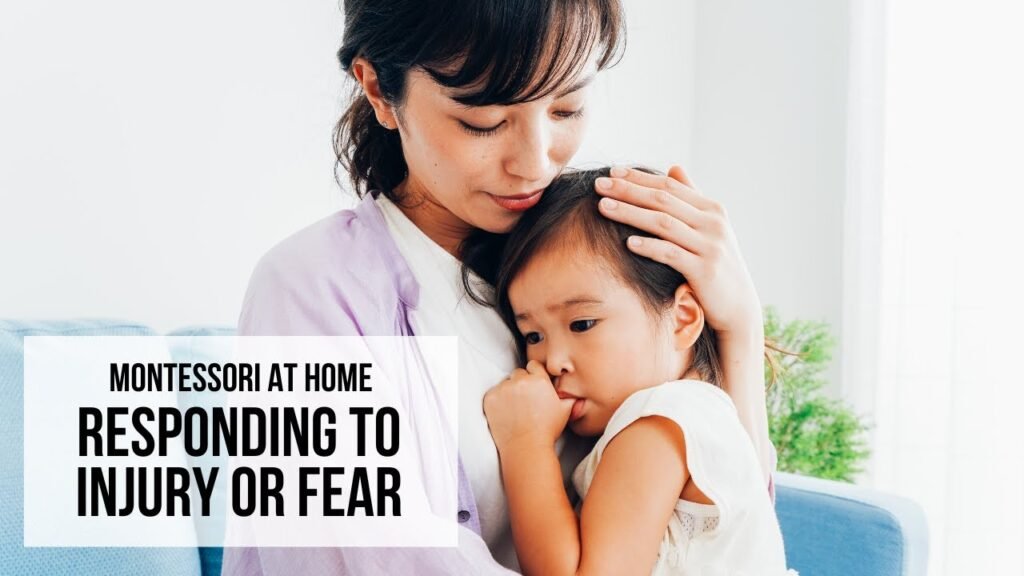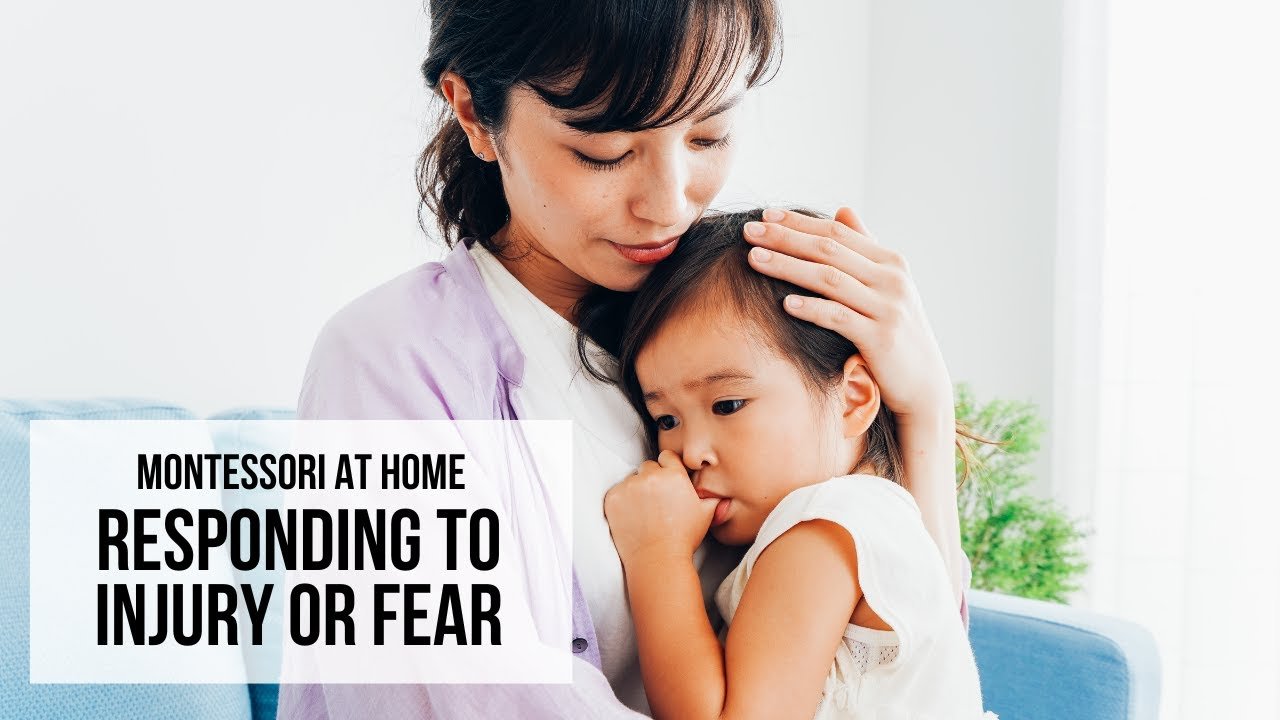Today’s article focuses on Montessori principles for handling children’s injuries and fears at home. The video by Hapa Family offers personal recommendations and tips for parents of young children, emphasizing validation of emotions and providing practical examples for responding effectively. The content aligns with Montessori parenting principles and aims to offer support and resources for parents seeking guidance in navigating these common situations.
In the video, Ashley, a mom of two, addresses a question from a parent in Germany regarding how to respond when a child gets hurt. She emphasizes the importance of acknowledging the child’s feelings, rather than dismissing or distracting them. By validating the child’s emotions and experiences, parents can create a supportive and understanding environment for their children to navigate moments of fear or injury. Remember, as a Montessori parent, your role is to accept and validate your child’s feelings, providing comfort and support until they are ready to move on from the experience.

Understanding Montessori Parenting Principles
As a parent, it is essential to understand the foundational principles of Montessori parenting when it comes to responding to injury or fear in young children. Montessori parenting places a strong emphasis on acknowledging the child’s feelings and experiences, as well as validating their emotions. By creating a supportive environment and promoting emotional well-being, parents can help their children navigate difficult situations with resilience and confidence.
Emphasis on Acknowledging Child’s Feelings
Montessori parenting emphasizes the importance of acknowledging a child’s feelings when they experience fear or get hurt. It is crucial to actively listen to your child’s response and show empathy and understanding. By recognizing their emotional state, you can create a safe space for them to express themselves freely.
Focus on Validating Emotions
In Montessori parenting, validating a child’s emotions is key to fostering healthy emotional development. Avoid dismissing their feelings with phrases like ‘It’s not a big deal’ and instead encourage open communication. By validating their emotions, you show them that it is okay to feel what they are feeling and that you are there to support them.
Importance of Responding to Injury or Fear
When children get hurt or are scared, how parents respond can have a lasting impact on their emotional well-being. Creating a supportive environment where children feel safe and understood is essential. By remaining calm and composed and assessing the severity of the injury, parents can effectively address their child’s needs.
Creating a Supportive Environment
A supportive environment is crucial for children when they experience injury or fear. By showing empathy and understanding, parents can help their child feel emotionally secure. This support creates a foundation for building resilience and confidence in handling difficult situations.
Promoting Emotional Well-being
Promoting emotional well-being in children involves responding to their needs with sensitivity and care. By acknowledging their feelings and experiences, parents can foster a sense of security and trust. This emotional support is vital for children’s overall development and well-being.
Handling Situations Where Children Get Hurt
When children get hurt, knowing how to respond is essential for parents. By remaining calm and composed, parents can model positive behavior and reassure their child. Assessing the severity of the injury is also crucial to determine the appropriate course of action.
Remaining Calm and Composed
In stressful situations where a child gets hurt, it is essential for parents to remain calm and composed. By staying level-headed, you can provide reassurance and comfort to your child. Your calm demeanor can help your child feel safe and secure during a challenging time.
Assessing the Severity of the Injury
Determining the severity of a child’s injury is crucial for deciding on the appropriate response. By assessing the situation carefully, parents can provide the necessary support and care for their child. Seeking medical attention when needed is also vital to ensure the child’s well-being.
Acknowledging Child’s Feelings and Experiences
When children express their feelings and experiences, it is essential for parents to acknowledge and validate them. Listening actively and showing empathy can help children feel heard and understood. By acknowledging their emotions, parents can support their child’s emotional development.
Listening Actively
Active listening is a cornerstone of Montessori parenting when it comes to responding to injury or fear. By listening attentively to your child’s words and emotions, you can show them that their feelings are valid. This active engagement fosters trust and open communication between parent and child.
Showing Empathy and Understanding
Expressing empathy and understanding towards your child’s feelings is crucial for their emotional well-being. By showing compassion and support, parents can create a nurturing environment where children feel safe to share their experiences. This display of empathy strengthens the parent-child bond and encourages healthy emotional expression.
Validating Emotions, Not Dismissing Them
To effectively respond to a child’s feelings of fear or injury, parents must validate their emotions. Avoiding dismissive phrases and encouraging open communication can help children feel supported. By validating their emotions, parents demonstrate that it is okay to express their feelings without judgment.
Avoiding Phrases like ‘It’s Not a Big Deal’
Dismissing a child’s feelings by saying ‘It’s not a big deal’ can invalidate their emotions. Instead, acknowledge their experience and offer comfort and reassurance. By avoiding dismissive language, parents can create a safe space for children to express themselves freely.
Encouraging Open Communication
Open communication is key to validating a child’s emotions and experiences. By encouraging your child to express how they feel, you foster a sense of trust and understanding. This communication allows parents to address their child’s needs effectively and provide the necessary support.
Practical Tips for Responding as a Montessori Parent
Incorporating practical tips for responding to injury or fear is essential for Montessori parents. By offering comfort and reassurance, parents can help children feel safe and secure. Involving the child in the decision-making process can empower them and promote independence.
Offering Comfort and Reassurance
When children experience fear or injury, offering comfort and reassurance is vital. By providing a supportive presence and physical comfort, parents can help their child feel safe. This reassurance creates a sense of security and trust, allowing the child to express their emotions freely.
Involving the Child in the Decision-making Process
Empowering children by involving them in the decision-making process can boost their confidence and independence. By giving children a voice in how they respond to injury or fear, parents promote autonomy and self-assurance. This active participation fosters a sense of ownership over their experiences and emotions.
Examples of Effective Communication
Effective communication plays a crucial role in responding to a child’s feelings of fear or injury. By using positive language and modeling calm behavior, parents can create a supportive environment for their child. These communication strategies help children feel understood and valued.
Using Positive Language
Positive language can reinforce a child’s emotional well-being and self-esteem. By using encouraging words and phrases, parents can offer support and guidance. Positive affirmations and reassurances communicate care and compassion, strengthening the parent-child bond.
Modeling Calm Behavior
Modeling calm behavior is essential for parents when responding to a child in distress. By staying composed and collected, parents can demonstrate emotional regulation and stability. Children often mirror the behavior of their caregivers, making it crucial for parents to model calmness and control in challenging situations.
Resources for Further Support and Learning
Montessori parenting principles provide a valuable framework for responding to injury or fear in children. Parents seeking additional support and learning opportunities can explore various resources. Books on Montessori parenting and online communities and forums offer valuable insights and advice for parents navigating challenging situations.
Books on Montessori Parenting
Books on Montessori parenting can provide in-depth guidance and strategies for responding to children’s emotions. Reading materials tailored to Montessori principles offer practical tips and techniques for parents. These resources can enhance parental understanding and support in addressing children’s needs effectively.
Online Communities and Forums for Parents
Engaging with online communities and forums dedicated to Montessori parenting can connect parents with shared experiences and knowledge. Interacting with other parents facing similar challenges can offer support and insights. Online platforms provide a space for exchanging ideas, seeking advice, and building a supportive network of like-minded individuals.
Conclusion
In conclusion, Montessori parenting principles offer a holistic approach to responding to injury or fear in young children. By acknowledging their feelings, validating their emotions, and offering comfort and support, parents can help children navigate difficult situations with resilience and confidence. Creating a supportive environment, promoting emotional well-being, and modeling positive communication are essential components of Montessori parenting. By incorporating practical tips and engaging with valuable resources, parents can effectively respond to their children’s emotional needs. Embracing the core principles of Montessori parenting fosters healthy emotional development and strengthens the parent-child relationship. As a Montessori parent, your role in responding to injury or fear is vital in shaping your child’s emotional well-being and confidence.

